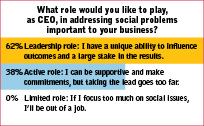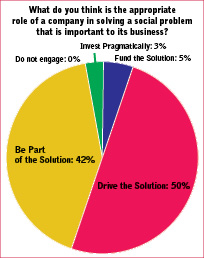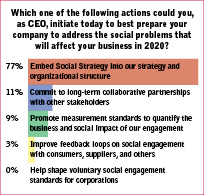Editors’ Note
Charles Moore has served as CEO of a variety of companies, including Allied Thermal, Clevepak Corporation, Ransburg Corporation, and Peers Managment He also served as Director of Athletics at Cornell University. He assumed his current post in 1999, and was selected as the 2008 Nonprofit CEO of the year by CRO magazine. Moore is a B.M.E. graduate of Cornell University.
Organization Brief
CECP (www.corporatephilanthropy.org) is a membership forum comprised of 175 CEOs and chairpersons committed to corporate philanthropy. Its members represent companies responsible for more than 40 percent of all corporate philanthropy in the U.S., and its mission is to lead the business community in raising the level and quality of corporate philanthropy.
What trends are you seeing in corporate philanthropy, and how is it evolving?
Last year, at our CEO Conference, Jeff Immelt (GE CEO) was very clear that he saw business at a point of reset. This year, we partnered with McKinsey & Company to probe the game-changing trends that will shape the landscape of corporate community involvement in the next 10 years. This forward-looking approach is consistent with more and more companies looking to integrate their social strategies with their business strategies in order to reinforce their competitive advantage, bringing the best of their business practices to their philanthropy. Companies are always more effective when they’re actively engaged in solving problems, as opposed to just funding problem-solving by others. Who better to address some of these complex problems than the corporations who can employ all of their financial, scientific, and strategic resources?
CECP’s 2010 Board of Boards CEO Conference
On the morning of International Corporate Philanthropy Day, CECP challenged leading CEOs to think about what the world – and the environment for business – could look like in the year 2020 if executives proactively adopt a solutions-oriented mindset on local and global social issues. This was the first in a three-part series of conferences staged by the Committee in 2010 in which global leaders will come together in closed-door sessions to investigate the opportunities and implications of the theme: Solving Social Problems through Business Strategy.
The following are a few of the poll results from this interactive event:
Many talk about the importance of tracking impact of these programs with metrics, as is done in business. Is there a focus on building a clear model of how that can be done, and how important is it?
Absolutely, and we do it in two ways: CECP has the only online, on-demand tool to measure and benchmark corporate giving, which includes not only what you’re giving and where, but why you’re giving it, because the motivations are always important. We have an amazing repository of $60 billion of corporate giving data, which is an invaluable resource.
Now, with the U.N. Global Compact, we are creating the first global set of principles, and the framework for measuring responsible social investment. So we are establishing the guidelines and principles for the world. Imagine getting 200 countries to agree on what’s in and what’s out in terms of how you invest in your communities? This is a huge step for companies in learning best practices in corporate giving.
In addition, the world has long known that it isn’t what you give, it’s what you’re accomplishing. There’s been some academic work done on measuring societal benefits, but very little done on the business benefits. So last year, we had the good fortune of having a Goldman Sachs Public Service Fellow spend a year researching this topic. The resulting breakthrough study, “Measuring the Value of Corporate Philanthropy: Social impact, business benefits, and investor returns,” focuses on three conversations: between the Senior Giving Officer and the grantee, between the CEO and the Senior Giving Officer, and between the CEO and the investor community.
The U.S. and parts of Western Europe have traditionally led corporate philanthropy, but have you seen an increasing focus from other regions internationally?
Yes, absolutely. In time, what a U.S. company does will be not much different than what a European company or an Asian company does. In 2010, CECP will for the first time hold two international CEO Conferences: in London on May 7, and in Abu Dhabi on November 11. These gatherings are amazing opportunities to compare results from the poll questions asked of CEOs in New York with those in these international locations. In Europe, the lead discussants will be Peter Brabeck-Letmathe, Chairman of Nestlé, who is one of the foremost in the world in terms of creating shared value; and Andrew Witty of GlaxoSmithKline, whose programs are literally eradicating diseases.
Corporations increasingly want to be part of the solution, and CEOs want to get involved. CECP is leading the way in setting the principles and the framework for accountability and strategy, helping business CEOs take ownership in leading their businesses and making this a better world.•





